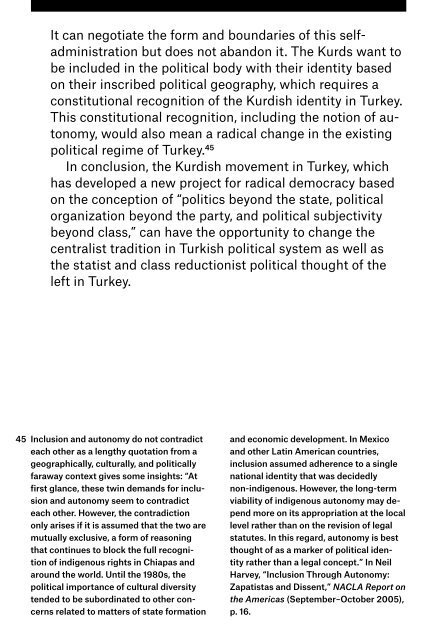Stateless Democracy
1RHiH4Y
1RHiH4Y
You also want an ePaper? Increase the reach of your titles
YUMPU automatically turns print PDFs into web optimized ePapers that Google loves.
It can negotiate the form and boundaries of this selfadministration<br />
but does not abandon it. The Kurds want to<br />
be included in the political body with their identity based<br />
on their inscribed political geography, which requires a<br />
constitutional recognition of the Kurdish identity in Turkey.<br />
This constitutional recognition, including the notion of autonomy,<br />
would also mean a radical change in the existing<br />
political regime of Turkey. 45<br />
In conclusion, the Kurdish movement in Turkey, which<br />
has developed a new project for radical democracy based<br />
on the conception of “politics beyond the state, political<br />
organization beyond the party, and political subjectivity<br />
beyond class,” can have the opportunity to change the<br />
centralist tradition in Turkish political system as well as<br />
the statist and class reductionist political thought of the<br />
left in Turkey.<br />
Ahmet Hamdi Akkaya is a PhD student in the Faculty of Political and<br />
Social Sciences at Ghent University, Ghent, where he is also doctoral<br />
researcher at the Middle Eastern and North Africa Research Group<br />
(MENARG). Joost Jongerden is Assistant Professor of Sociology and<br />
Anthropology of Development at Wageningen University, Wageningen.<br />
This article first appeared in European Journal of Turkish Studies 14<br />
(2012). It appears here in lightly edited form with permission of the<br />
authors.<br />
Bibliography<br />
Akinan, S. 2009. “Güzel günler yakında mı?” Akşam, 3 April 2009 (accessed<br />
9 April 2009).<br />
Akkaya, Ahmet Hamdi and Joost Jongerden. 2011. “The PKK in 2000s: Continuity<br />
through breaks?,” In Marlies Casier and Joost Jongerden eds., Nationalisms<br />
and Politics in Turkey: Political Islam, Kemalism and the Kurdish Issue. London:<br />
Routledge.<br />
Badiou, Alain. 2002. Ethics: An Essay on the Understanding of Evil. London: Verso.<br />
Birand, Mehmet Ali. 2009. “Let’s hear the voice of the Kurds (II).” Hürriyet<br />
(accessed 9 April 2009).<br />
Barkey, H. and Fuller, G. 1998. Turkey’s Kurdish Question. Oxford: Rowman &<br />
Littlefield.<br />
45 Inclusion and autonomy do not contradict<br />
each other as a lengthy quotation from a<br />
geographically, culturally, and politically<br />
faraway context gives some insights: “At<br />
first glance, these twin demands for inclusion<br />
and autonomy seem to contradict<br />
each other. However, the contradiction<br />
only arises if it is assumed that the two are<br />
mutually exclusive, a form of reasoning<br />
that continues to block the full recognition<br />
of indigenous rights in Chiapas and<br />
around the world. Until the 1980s, the<br />
political importance of cultural diversity<br />
tended to be subordinated to other concerns<br />
related to matters of state formation<br />
and economic development. In Mexico<br />
and other Latin American countries,<br />
inclusion assumed adherence to a single<br />
national identity that was decidedly<br />
non-indigenous. However, the long-term<br />
viability of indigenous autonomy may depend<br />
more on its appropriation at the local<br />
level rather than on the revision of legal<br />
statutes. In this regard, autonomy is best<br />
thought of as a marker of political identity<br />
rather than a legal concept.” In Neil<br />
Harvey, “Inclusion Through Autonomy:<br />
Zapatistas and Dissent,” NACLA Report on<br />
the Americas (September–October 2005),<br />
p. 16.<br />
Bila, Fikret. 2004. Satranç tahtasındaki yeni hamleler: Hangi PKK? Ankara: Ümit<br />
Yayıncılık.<br />
Bookchin, Murray. 1982. The Ecology of Freedom: The Emergence and Dissolution<br />
of Hierarchy. Palo Alto: Cheshire Books.<br />
1992. “Libertarian Municipalism: An Overview.” Society and Nature 1, no.1.<br />
1993. The Meaning of Confederalism, Society and Nature 1, no. 3.<br />
1996. From Urbanization to Cities: Toward a New Politics of Citizenship. London:<br />
Cassell.<br />
Casier, Marlies. 2010. “Turkey’s Kurds and the Quest for Recognition. Transnational<br />
Politics and the EU-Turkey accession negotiations.” Ethnicities 10, no. 1.<br />
2011. “Beyond Kurdistan? The Mesopotamia Social Forum and the appropriation<br />
and re-imagination of Mesopotamia by the Kurdish Movement.” Journal of Balkan<br />
and Near Eastern Studies 13, no. 4.



